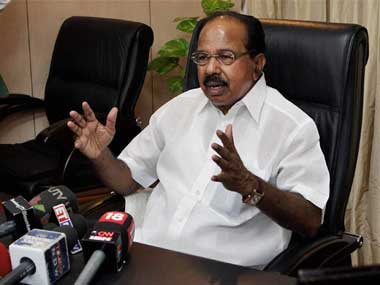Oil Minister Veerappa Moily has to get his priorities right. Whatever he is doing to India’s energy market is unlikely to be good in the long term because the government’s fuel pricing policy has put carriage in front of the horses.
According to media reports, the minister has said the government will notify the new gas pricing formula in three weeks. The development, the reports say, will end the policy uncertainty that has marred the Indian energy sector for long.
That may be true but the move is also likely to have a negative impact on the energy market.
[caption id=“attachment_1214321” align=“alignright” width=“380”]  PTI[/caption]
This is because the new pricing formula which the government is about to adopt will lift the natural gas prices so high that diesel and LPG are likely become cheaper due to the subsidies offered on these fuels.
According to a report in The Economic Times today, the new gas pricing formula is likely to deal a body blow to city gas distributors. These companies say natural gas will not be in a position to beat LPG and diesel, which are heavily subsidised by the government.
They fear piped gas may be rendered financially unviable for households once the new natural gas pricing formula is implemented.
As per the new pricing formula suggested by the Rangarajan committee, natural gas prices will nearly double to $8 from the present $4.2 per million British thermal unit.
Piped-gas companies are now importing liquefied natural gas at $18 per unit. Their margins were in the city gas distribution and auto gas sectors were squeezed due to this already. But this was compensated as these companies sold gas to industrial units. But industrial customers have started ditching them as the prices are high, the report says quoting an official from a state-owned gas distribution company.
The issue points to a major anomaly in the government’s energy policy and spells disaster for city gas distribution companies.
One reason for the government’s nonchalant attitude in the issue could be because all the companies engaged in city gas distribution are state-owned. And so, as an official with a Gujarat gas company says in the report, they cannot take a firm stand against the regulator or the government.
“In such situation, we are unsure about the future roadmap for the gas distribution business,” the official has told the newspaper.
Above all, the skewed policy could also have negative impact on environment. This is because consumers shifting from natural gas, which is considered cleaner, to diesel and LPG also means higher pollution.
For the government to resolve this anomaly, the only way out is decontrol diesel and LPG prices fully at the earliest. Otherwise it may just sound a death knell for city gas distribution business.


)
)
)
)
)
)
)
)
)



